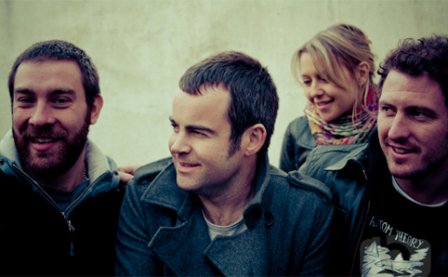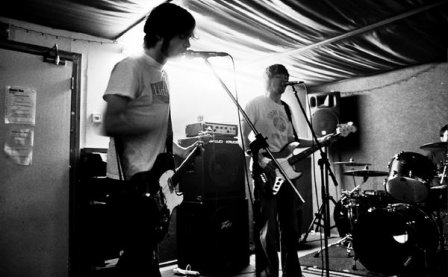If you’re a fan of Future of the Left, then by now you’ve probably had a chance to see front man Andrew Falkous’ scathing rejoinder to Pitchfork’s review of his latest album. Among the many criticisms that drew the musician’s ire was an implication that Falkous, whose wit and rancor have become legendary in the indie rock community, spent too much of The Plot Against Common Sense taking pot shots at easy targets. Normally an incident like this wouldn’t be worth commenting on, except that, in this case, I think Pitchfork’s accusations point to a more pervasive attitude towards Falkous and his body of work, one that presents an overly simplified view of the artist in question.
The fact is, we in the music press have spent the last decade-and-change driving home the point that Andrew Falkous was one caustic motherfucker. And not without reason; anyone who’s seen him perform live can attest to the effortlessness with which he verbally eviscerates hecklers, and his former act mclusky achieved a good deal of their notoriety by poking fun at the music industry with songs like “Collagen Rock” and “Fuck This Band.” So no matter what new ground Falkous covered, no matter how he grew or matured as an artist, it was kind of hard to shake his image as the indie rock Don Rickles. But while it’s a convincing portrait when viewed from a distance, it’s incredibly limiting upon closer examination, especially when you consider that many of Falkous’ most memorable lyrics gain their humor and poignancy from the incongruous vulnerability they display. Beneath that frothing exterior pulses a note of unmistakable anxiety. Just look at his strangled lament that “In the midst of all the touching and the kissing/ We forgot the penetration” on “Day of the Deadringers” or his wearied plea “What kind of orgy leaves/ A sense of deeper love?” from “You Need Satan More than He Needs You.”
The latter track is actually a perfect example of the point that I’m trying to make. The song works not by sticking it to devil worshipers, but by humanizing them, by imparting upon them the same sort of mundane fears and concerns that plague the rest of us. Failing to acknowledge this peculiar anxiousness, however, leads to a jaundiced and one-dimensional view of Falkous as a songwriter. It casts aside all the odd ticks, complexities, and idiosyncrasies of his lyrics, and reduces the tracklist of every new Future of the Left album to little more than a hit-list. And don’t get me wrong, Plot comes packed with a gland full of venom and spits it gleefully in the face of Hollywood and the occupy movement, but most of its best moments aren’t scathing tirades or merciless lampoons. They’re songs like “Polymers Are Forever,” a holdover from last year’s EP of the same name that offers an almost Isaac Brock-like meditation on the transience of existence and ends up finding a perverse comfort in the permanence of plastic waste. “Failed Olympic Bid” contrasts a litany of plans for hosting the Olympics in England with the straight-faced warning in the chorus that “A failed Olympic bid/ Leaves some kids so upset/ They can’t forget.” Perhaps the most neurotic entry of them all, “I Am the Least of Your Problems,” wrings its hands over celebrity identity and Onanistic gratification. It’s impossible to boil the appeal of these songs down to pure cynicism; they operate on a variety of emotional levels.
Musically, Plot contains a familiar mix of straight-ahead scorchers and bouncier mid-tempo tunes, but it also finds the group exploring new textures and structures. “City of Exploded Children” floats along at an uncharacteristically leisurely pace that strikes a jarring contrast to its sinister bass line, finally collapsing into a multi-tracked vocal harmony reminiscent of mclusky’s “She Will Bring You Nothing but Happiness.” Other songs undergo unexpected metamorphoses, like the spastic “Robocop 4 - Fuck off Robocop” that lurches forward in a series of staccato riffs and dissolves at random into ambient feedback, or the aforementioned “Polymers…,” which begins at an industrial stomp and gradually unfurls into something more grand and soothing. A few of the songs flirt rather successfully with more mainstream alt-rock sounds, like “Beneath the Waves an Ocean” and “Goals in Slow Motion,” which make use of crisp, ringing guitar tones to give the songs a cleaner feel.
These divergences in sound could have been helped along by the group’s recent personnel changes: the departure of bassist Kelson Mathias and the conversion of the group into a four-piece with Jimmy Watkins and Julie Ruzicka. Ruzicka’s bass work is even more reminiscent of David Wm. Simms than Mathias’, and it provides many of the songs a snarling, bottom-heavy feel. They also manage to both make more creative use of that Roland Juno-60 to give “Failed Olympic Bid” an abrasive electronic sheen and add tinnier embellishments to songs like “A Guide to Men” and “Cosmos Ladder.”
My only complaint about the album, and the only aspect of the record that sends up warning flags for me, is that it’s a little heavy-handed in the pop-culture department. Falkous hasn’t been shy in the past about seasoning his songs with allusions to Transformers, Star Wars, or The Shawshank Redemption, but Plot takes this to a whole new level. Over the course of 15 tracks, he references The Ramones, Harry Potter, Pirates of the Caribbean, Slipknot, Russell Brand, and Pele, among a host of others. Only in this mode does Falkous come close to resembling the caricature that the indie media has drawn of him, and the chuckles that he elicits feel ultimately less satisfying than the more cryptic pleasures offered by the surrounding tracks. Otherwise, The Plot Against Common Sense finds FotL in fine form. It’s Falkous’ most eclectic crop of songs to date and stands out as a great guitar-rock album in a year that’s seen its fair share of them already.
More about: Future of the Left




